The U.S. public’s views of banks and other financial institutions, as well as large corporations, have become much more negative in recent years. Today, these institutions are both held in low esteem by Americans in both parties.
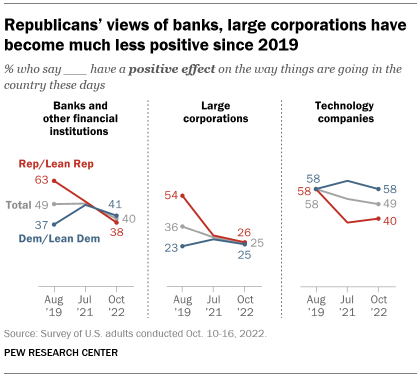
About four-in-ten Republicans and Republican-leaning independents (38%) and Democrats and Democratic leaners (41%) now say banks and other financial institutions have a positive effect on the way things are going in the country. Even smaller shares – 26% of Republicans and 25% of Democrats – say large corporations have a positive effect, according to a survey conducted Oct. 10-16 by Pew Research Center.
Pew Research Center conducted this study to understand the U.S. public’s impressions of several institutions in the country. For this analysis, we surveyed 5,098 adults from Oct. 10 to 16, 2022. Everyone who took part in this survey is a member of the Center’s American Trends Panel (ATP), an online survey panel that is recruited through national, random sampling of residential addresses. This way nearly all U.S. adults have a chance of selection. The survey is weighted to be representative of the U.S. adult population by gender, race, ethnicity, partisan affiliation, education and other categories. Read more about the ATP’s methodology.
Here are the questions used for this report, along with responses, and its methodology.
While Democrats’ views of banks and big corporations have only modestly changed since 2019 (41% vs. 37%), Republicans’ assessments have become much more negative. Three years ago, Republicans were far more likely than Democrats to say banks and other financial institutions (63% vs. 37%) and large corporations (54% vs. 23%) had a positive effect on the way things were going in the country.
Republicans have also become much more negative in their opinions of technology companies. In 2019, identical shares of Democrats and Republicans (58% each) said technology companies had a positive effect on the country. While Democrats’ views are unchanged, the share of Republicans with a positive view had fallen 20 percentage points by 2021 and has changed little since then (currently 40%).
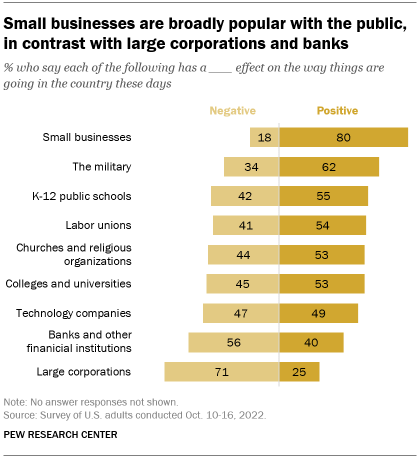
Overall, Americans view small businesses much more positively than the eight other institutions included in the survey. Eight-in-ten adults say small businesses have a positive effect on the way things are going in the country, and just 18% say they have a negative effect.
Majorities of Americans also say the military (62%), K-12 public schools (55%), labor unions (54%), churches (53%), and colleges and universities (53%) have a positive effect on the way things are going in the country.
The public is divided in its evaluations of technology companies (49% positive, 47% negative).
Majorities of Americans express negative views of banks and other financial institutions, as well as large corporations. While 56% say banks and other financial institutions have a negative effect on the way things are going in the country, even more (71%) say the same about large corporations.
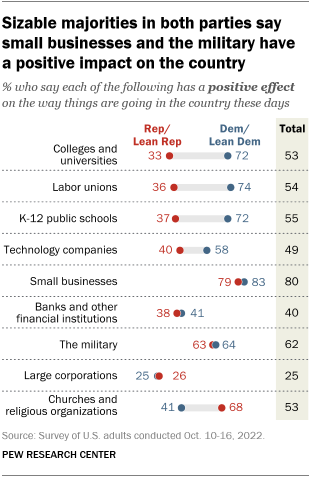
Comparably large majorities of both Democrats and Republicans say small businesses have a positive impact on the country these days (83% vs. 79%). And majorities in both parties view the military positively (64% of Democrats, 63% of Republicans).
However, the two parties differ widely over the effect that colleges and universities, labor unions, K-12 public schools, churches and technology companies have on the way things are going in the country.
Democrats are roughly twice as likely as Republicans to say colleges, unions and public schools have a positive impact. Conversely, Republicans are more likely than Democrats (68% vs. 41%) to say churches and religious organizations have a positive effect on the country.
Ideological differences in views of several major institutions
Americans across the ideological spectrum overwhelmingly say that small businesses have a positive effect on the country – and for the most part think that large corporations have a negative effect.
In the case of banks and financial institutions, 65% of liberal Democrats and 60% of conservative Republicans say they have a negative impact. By comparison, 49% of conservative and moderate Democrats and 56% of moderate and liberal Republicans say the same.
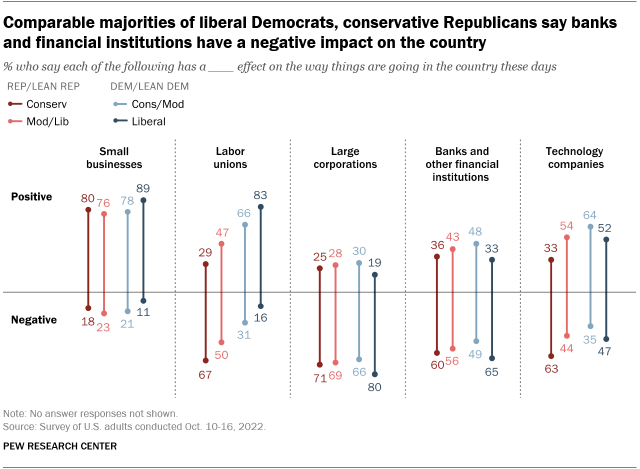
However, there are wide partisan and ideological differences in opinions of how labor unions and technology companies affect the country. An overwhelming majority of liberal Democrats (83%) express positive views of labor unions, as do about two-thirds of conservative and moderate Democrats (66%). Among Republicans, 47% of moderates and liberals and 29% of conservatives view unions positively. Conservative Republicans also are far more critical than other ideological groups, including moderate and liberal Republicans, of the impact of technology companies.
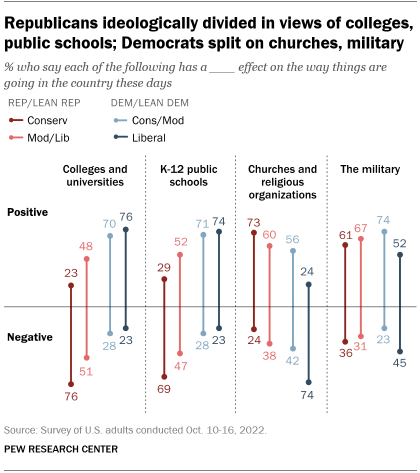
For several years, Republicans – especially conservative Republicans – have expressed more negative than positive views of colleges and universities. This remains the case today, with about three-quarters (76%) of conservative Republicans saying colleges affect the country negatively.
Moderates and liberals in the GOP are split in their views on colleges and universities (48% positive, 51% negative), and large majorities of both liberal and moderate or conservative Democrats say these institutions have a positive impact on the country.
Opinions of K-12 public schools follow a similar pattern: 29% of conservative Republicans say they have a positive impact, by far the lowest share among ideological groups.
See also: Republicans’ confidence in K-12 principals has fallen sharply during the pandemic
Among Democrats, there are wide ideological differences on views of both religious organizations and the military. While a majority of conservative and moderate Democrats (56%) say churches and religious organizations have a positive effect on the country, about three-quarters of liberal Democrats (74%) say religious institutions have a negative effect on the country. Among Republicans, majorities of both conservatives (73%) and moderates and liberals (60%) say churches and religious organizations have a positive effect on the way things are going in the country.
Roughly three-quarters of conservative and moderate Democrats (74%) say the military is having a positive effect on the way things are going in this country, a greater share than among other ideological groups. Two-thirds of moderate and liberal Republicans view the military positively, as do 61% of conservative Republicans. Liberal Democrats are less likely than other groups to view the military positively, with about half (52%) saying it has a positive effect on the country and 45% viewing it negatively.
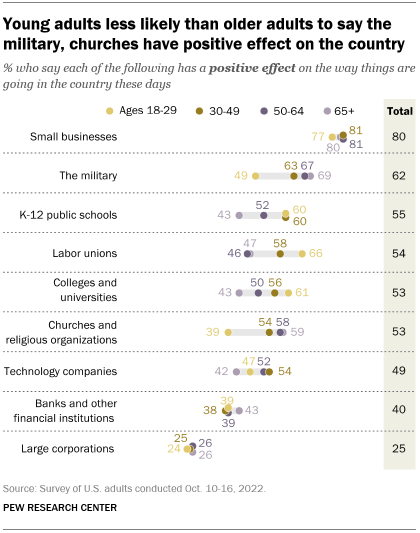
Opinions on these institutions – especially the military and churches – also vary across age groups.
Adults ages 18 to 29 stand out for their skepticism toward the military, with 49% saying it has a positive effect on the way things are going in the country, the lowest share in any age group. Adults under age 30 are also less likely than those 30 and older to say churches and religious organizations have a positive impact.
Adults under the age of 50 are more likely than those ages 50 t0 64 (52%) and those 65 and older (43%) to say K-12 public schools have a positive effect on the country. There is a similar pattern on views of colleges and universities.
Note: Here are the questions used for this report, along with responses, and its methodology.




